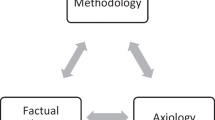Abstract
The notion of definition is a central building block of mathematics. In addition to specific definitions, it is desirable that students learn about meta-mathematical aspects of definitions such as their role of classification, and about characteristics of definitions such as arbitrariness. We investigated how such meta-mathematical aspects emerge when students are led to construct a definition such as point of inflection or tangent line, and how the constructing process interacts with meta-mathematical aspects. We used Abstraction in Context as theoretical framework because of its suitability to analyze processes of knowledge construction. We found that meta-mathematical aspects of definitions influence and are influenced by students’ processes of constructing definitions. We argue that awareness of meta-mathematical aspects improves students’ conception of mathematical definitions.






Similar content being viewed by others
References
Borasi, R. (1992). Learning mathematics through inquiry. Heinemann.
Dawkins, P. C. (2014). How students interpret and enact inquiry-oriented defining practices in undergraduate real analysis. Journal of Mathematical Behavior, 33, 88–105. https://doi.org/10.1016/j.jmathb.2013.10.002
De Villiers, M., Govender, R., & Patterson, N. (2009). Defining in geometry. In T. V. Crain & R. Rubenstein (Eds.), Understanding geometry for a changing world (pp. 189–203). National Council of Teachers of Mathematics.
Dreyfus, T., Hershkowitz, R., & Schwarz, B. (2015). The nested epistemic actions model for abstraction in context: Theory as methodological tool and methodological tool as theory. In A. Bikner-Ahsbahs, C. Knipping & N. Presmeg (Eds.), Approaches to qualitative research in mathematics education: Examples of methodology and methods. Advances in mathematics education series (pp. 185–217). Springer.
Edwards, B. S., & Ward, M. B. (2004). Surprises from mathematics education research: Students (mis)use of mathematical definitions. The American Mathematical Monthly, 111, 411–424. https://doi.org/10.1080/00029890.2004.11920092
Freudenthal, H. (1973). Mathematics as an educational task. Reidel.
Gilboa, N. (2016). The need for a mathematical definition and its implications for the construction of the definition in high-school students [Unpublished Ph.D. Thesis. Tel Aviv University]. Tel Aviv, Israel. [in Hebrew]. https://tau.primo.exlibrisgroup.com/permalink/972TAU_INST/quev9q/alma990025159230204146
Gilboa, N., Kidron, I., & Dreyfus, T. (2019). Constructing a mathematical definition: The case of the tangent. International Journal of Mathematical Education in Science and Technology, 50(3), 421–446. https://doi.org/10.1080/0020739X.2018.1516824
Haj-Yahya, A. (2021). Students' conceptions of the definitions of congruent and similar triangles. International Journal of Mathematical Education in Science and Technology, 1–25. https://doi.org/10.1080/0020739X.2021.1902008
Kidron, I. (2008). Abstraction and consolidation of the limit procept by means of instrumented schemes: The complementary role of three different frameworks. Educational Studies in Mathematics, 69(3), 197–216. https://doi.org/10.1007/s10649-008-9132-6
Kotsopoulos, D. (2007). Mathematics discourse: It’s like hearing a foreign language. The Mathematics Teacher, 101(4), 301–305. https://doi.org/10.5951/MT.101.4.0301
Leikin, R., & Zazkis, R. (2010). On the content dependence of prospective teachers’ knowledge: A case of exemplifying definitions. International Journal of Mathematical Education in Science and Technology, 41(4), 451–466. https://doi.org/10.1080/00207391003605189
Ouvrier-Buffet, C. (2006). Exploring mathematical definition construction processes. Educational Studies in Mathematics, 63(3), 259–282. https://doi.org/10.1007/s10649-005-9011-3
Ouvrier-Buffet, C. (2015). A Model of mathematicians' approach to the defining processes. In CERME 9th Congress of the European Society for Research in Mathematics Education (pp. 2214–2220). https://hal.science/CERME9-TWG14
Pimm, D. (1993). Just a matter of definition. Book review. Educational Studies in Mathematics, 25(3), 261–277. https://www.jstor.org/stable/3482737
Schwartzman, S. (1994). The words of mathematics. The Mathematical Association of America
Tabach, M., & Nachlieli, T. (2015). Classroom engagement towards using definitions for developing mathematical objects: The case of function. Educational Studies in Mathematics, 90(2), 163–187. https://doi.org/10.1007/s10649-015-9624-0
Tall, D., & Vinner, S. (1981). Concept image and concept definition in mathematics with particular reference to limits and continuity. Educational Studies in Mathematics, 12(2), 151–169. https://doi.org/10.1007/BF00305619
Thomas, M., de Freitas Druck, I., Huillet, D., Ju, M. K., Nardi, E., Rasmussen, C., & Xie, J. (2015). Key mathematical concepts in the transition from secondary school to university. In S. J. Cho (Ed.), Proceedings of the 12th International Congress on Mathematical Education (pp. 265–284). Springer. https://link.springer.com/book/10.1007/978-3-319-12688-3#toc
Van Dormolen, J., & Zaslavsky, O. (2003). The many facets of definition: The case of periodicity. Journal of Mathematical Behavior, 22, 91–106. https://doi.org/10.1016/S0732-3123(03)00006-3
Vinner, S. (1991). The role of definitions in the teaching and learning of mathematics. In D. Tall (Ed.), Advanced Mathematical Thinking (pp. 65–81). Dordrecht, The Netherlands: Kluwer. https://doi.org/10.1007/0-306-47203-1_5
Vinner, S., & Hershkowitz, R. (1980). Concept images and common cognitive paths in the development of some simple geometrical concepts. In R. Karplus (Ed.), Proceedings of the 4th Conference of the International Group for the Psychology of Mathematics Education (pp. 177–184). UC Berkeley and PME.
Zaslavsky, O., & Shir, K. (2005). Students’ conceptions of a mathematical definition. Journal for Research in Mathematics Education, 36(4), 317–346. https://doi.org/10.2307/30035043
Funding
This research has been partially supported by the Israel Science foundation under grant numbers 1743/19 and 1815/16.
Author information
Authors and Affiliations
Corresponding author
Additional information
Publisher's note
Springer Nature remains neutral with regard to jurisdictional claims in published maps and institutional affiliations.
Rights and permissions
Springer Nature or its licensor (e.g. a society or other partner) holds exclusive rights to this article under a publishing agreement with the author(s) or other rightsholder(s); author self-archiving of the accepted manuscript version of this article is solely governed by the terms of such publishing agreement and applicable law.
About this article
Cite this article
Gilboa, N., Dreyfus, T. & Kidron, I. Meta-mathematical aspects of definitions. Educ Stud Math 114, 461–481 (2023). https://doi.org/10.1007/s10649-023-10252-x
Accepted:
Published:
Issue Date:
DOI: https://doi.org/10.1007/s10649-023-10252-x




